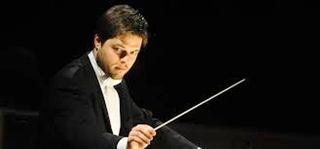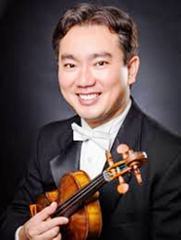|
Back
The Romantics Updated New York
David Geffen Hall, Lincoln Center
10/31/2018 - & November 1, 3, 2018
Erich Wolfgang Korngold: Suite from Much Ado About Nothing, Opus 11
Samuel Barber: Concerto for Violin and Orchestra, Opus 14
Sergei Rachmaninoff: Symphonic Dances, Opus 45
Frank Huang (Violin)
New York Philharmonic Orchestra, Juraj Valcuha (Conductor)

J. Valcuha
Eugene Ormandy took a month some eight decades ago, to lead his Philadelphia Orchestra in two world premieres by two Romantic composers. New York is much faster. Only a 15-minute intermission, and the New York Philharmonic played the same pieces.
This time not the Hungarian-born Ormandy, but the Slovak-born Juraj Valcuha was on the dais last night for Samuel Barber’s Violin Concerto (first played February 1941), and Sergei Rachmaninoff’s final work, the Symphonic Dances (first played January 1941). Both composers were gently scorned in their time for being neither Stravinskyan or Schoenbergian, for wearing their musical hearts on their sleeves. Neither writer paid any attention. And today we realize that with the right performers, both works can be stirring.
Conductor Valcuha had no problem with either piece, especially when the NY Phil Concertmaster, Frank Huang, took over the Barber Concerto.

F. Huang
(© New York Philharmonic)
Mr. Huang has become a favorite of Phil audiences, as much for his courtly, almost 18th Century bows, his elegance, as a leader of the orchestra itself. When he played the first measures of the Barber work (and these initial measures are as luscious as the opening of the Bartók Violin Concerto), it was apparent that Mr. Huang’s solo personality is as engaging as his work with the ensemble.
Aaron Copland called Barber “outmoded”, and perhaps this lyrical work was, like the following Rachmaninoff, too songful at times. Yet this fit exactly into Mr. Huang’s dextrous hands. It was certainly not a fiery Barber, but the soloist worked hard to dig into the deepest aspects of the melodies. The tone was never astringent, as some soloists might do to give the work more weight. But it was never ever saccharine, as he kept pace with Mr. Valcuha’s tempos.
In fact, so songful was the performance that one hardly noticed the cadenzas in the first two movements. Mr. Huang never needed to show off his instrument. Both the technical passages and the really dynamic climaxes in the second movement were played as one organic entity.
The finale has always been a problem with even the best fiddler. Its devotee complained initially that the Concerto was lacking technical problems. So when Barber made the finale Presto in moto perpetuo, that same soloist complained it was “unplayable.”
Until one of the students at Curtis Institute played it for him!
Frank Huang played the technical challenges, with the illusion that it was a simple exercise. His only problem–with is no problem at all–is that he lacks the personal fireworks to show how challenging his performance can be. To fiddler fanatics, though, he is simply a splendid player.
Barber wrote his piece at the end of his lyrical period, and later composed more atonal, more “contemporary” music. Rachmaninoff, composing his final work, never had a chance to “change”. Nor did he ever feel it necessary to finagle with the spirit and mind from which he drew his inspirations.
Thus on its own exuberant moods, the Symphonic Dances dance on their own, with a large orchestra (including alto saxophone), a variety of rhythms, and the inevitable Dies Irae from the composer. Maestro Valcuha offered a good down-to-earth performance, though hardly the most exciting I’ve ever heard. Perhaps his trouble was a profusion of rubati, pauses which were too long, retards when not necessary.
This, though, was no real danger to a work which sings itself, and the opposite of a man who was on death’s doorstep.
The concert began with a rarity, Erich Korngold’s suite from stage music he wrote for Shakespeare’s Much Ado About Nothing in 1920.
Korngold wrote a few pieces which are genuinely priceless, including the Violin Concerto and a few arias from his operas. He is best known today for is wondrous music to the 1930’s and 1940’s Warner Brothers adventure tales (notably those with Errol Flynn) and weepies (Bette Davis). And this was why the Much Ado suite was so terrific. The overture and final dance did sound like movie music.
When French horn-player Richard Deane played any of his numerous solos, one was reminded of the whooping horns and brass of Captain Blood. In the Garden Scene, one heard The Private Lives of Elizabeth and Essex. All to the better.
(Then again, for this first hearing of the Garden Scene, I was expecting something along the delicate lines of Berlioz or Delius. That was hardly to be.)
Still, a jolly enough opening for a Halloween evening by an energetic and accomplished conductor.
Harry Rolnick
|